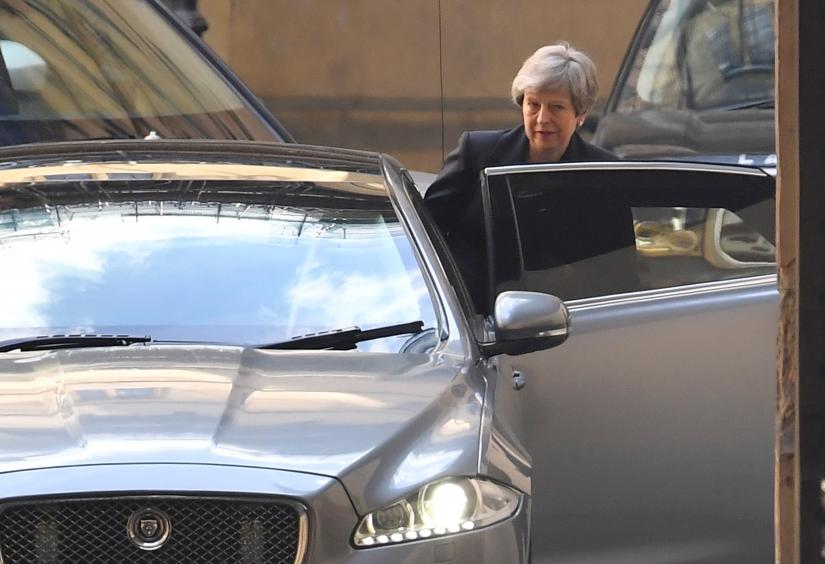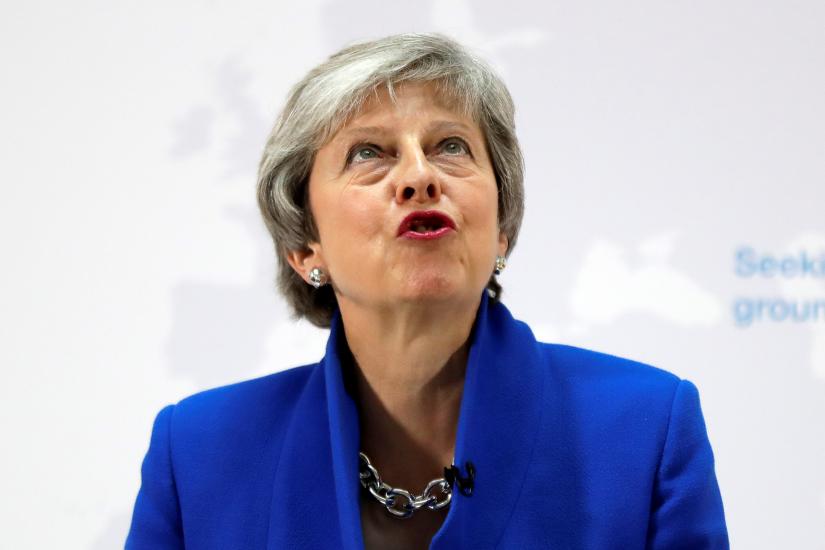 British Prime Minister Theresa May's final Brexit gambit was in tatters on Wednesday after her offer of a vote on a second referendum and closer trading arrangements failed to win over either opposition lawmakers or many in her own party.
British Prime Minister Theresa May's final Brexit gambit was in tatters on Wednesday after her offer of a vote on a second referendum and closer trading arrangements failed to win over either opposition lawmakers or many in her own party.
Nearly three years since Britain voted 52% to 48% to leave the European Union, May is trying one last time to get her divorce deal approved by the British parliament before her crisis-riven premiership ends.
May again appealed to lawmakers get behind her, offering the prospect of a possible second referendum on the agreement and closer trading arrangements with the EU as incentives to what she called the only way to prevent a so-called no deal Brexit.
But the backlash was fierce. Both ruling Conservative and opposition Labour lawmakers criticised May's Withdrawal Agreement Bill, or WAB, legislation which implements the terms of Britain's departure. Some upped efforts to oust her and there were reports that her own ministers could move against her.
The impasse in London means it is unclear how, when or even if Britain will leave the European club it joined in 1973. The current deadline to leave is Oct. 31.
Despite the criticism, May stood firm, urging lawmakers to back the bill and then have a chance to make changes to it, so they can have more control over the final shape of Brexit.
"In time another prime minister will be standing at this despatch box," May said, acknowledging that her time as prime minister was drawing to a close.
"But while I am here, I have a duty to be clear with the House (of Commons) about the facts. If we are going to deliver Brexit in this parliament we are going to have to pass a Withdrawal Agreement Bill," she told parliament, where many of her critics left the chamber allowing some of her backers to offer support for her argument to pass the Withdrawal Bill.
Asked by eurosceptic lawmaker Jacob Rees-Mogg whether she really believed in the new deal she had proposed or whether she was simply going through the motions, May said:
"I don't think I would have been standing here at the despatch box and be in receipt of some of the comments I have been in receipt of from colleagues on my own side and across the house if I didn't believe in what I was doing," she said. "GOT TO GO"
"GOT TO GO"
Britain’s crisis over Brexit has stunned allies and foes alike, and with deadlock in London, the world's fifth largest economy faces an array of options including an exit with a deal to smooth the transition, a no-deal exit, an election or a second referendum.
The pound was on track for its longest ever losing streak against the euro as some traders said they saw the rising chance of a no-deal Brexit. Those fears pushed investors into the relatively safety of government bonds - particularly those that offer protection against a spike in inflation.
Despite the signs of some support in a near empty parliament, her move towards lawmakers who want to stay in the EU incensed many in her party.
"The proposed second reading of the WAB is clearly doomed to failure so there really is no point wasting any more time on the prime minister's forlorn hope of salvation," Andrew Bridgen, a Conservative lawmaker, told Reuters. "She's got to go."
More Conservative lawmakers handed over letters to the 1922 Committee, a Conservative group that can make or break party leaders, to demand a no confidence vote in May, whose strategy to leave the EU has been left in tatters.
Local reporters said there were rumours that cabinet ministers were starting a move against her.
Asked about the pressure to resign, her spokesman said: "The PM is focused on the job in hand and what the last 24 hours or so have proved, it is a big one."
Several lawmakers, including Labour's Brexit policy chief Keir Starmer, said there was little point holding next month's vote on her bill, which most agreed had no chance of passing a deeply divided parliament.
Jeremy Corbyn, Labour leader, said his party would not be backing the bill and described the government as "too weak, too divided to get this country out of the mess that they have created".
 International
International
30897 hour(s) 44 minute(s) ago ;
Morning 04:38 ; Friday ; Apr 26, 2024
May's Brexit gambit fails as her premiership fades
Send
Reuters
Published : 21:50, May 22, 2019 | Updated : 21:55, May 22, 2019
Published : 21:50, May 22, 2019 | Updated : 21:55, May 22, 2019
0 ...0 ...
/zmi/
Topics: Top Stories
- KOICA donates medical supplies to BSMMU
- 5 more flights to take back British nationals to London
- Covid19: Rajarbagh, Mohammadpur worst affected
- Momen joins UN solidarity song over COVID-19 combat
- Covid-19: OIC to hold special meeting
- WFP begins food distribution in Cox’s Bazar
- WFP begins food distribution in Cox’s Bazar
- 290 return home to Australia
- Third charter flight for US citizens to return home
- Dhaka proposes to postpone D8 Summit
Unauthorized use of news, image, information, etc published by Bangla Tribune is punishable by copyright law. Appropriate legal steps will be taken by the management against any person or body that infringes those laws.
Bangla Tribune is one of the most revered online newspapers in Bangladesh, due to its reputation of neutral coverage and incisive analysis.
F R Tower, 8/C Panthapath, Shukrabad, Dhaka-1207 | Phone: 58151324; 58151326, Fax: 58151329 | Mob: 01730794527, 01730794528


